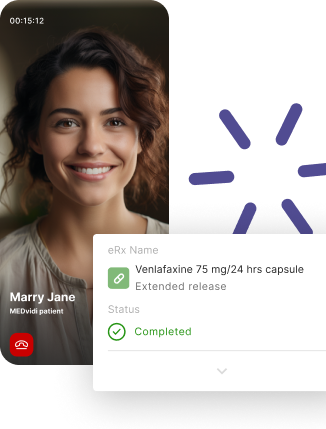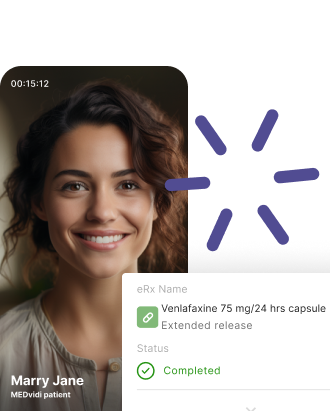Highlights
- Brain fog is a common experience for people with ADHD, but it can be managed through lifestyle changes and ADHD treatment.
- Prioritizing sleep, exercise, and proper nutrition can significantly reduce symptoms of brain fog.
- It’s important to address any co-occurring physical or mental health conditions that might be causing or making brain fog worse.
If you have attention-deficit hyperactivity disorder (ADHD), you may have experienced “brain fog” — a frustrating experience that makes it harder to focus, think clearly, or make decisions. It can feel like your brain is literally “foggy” or cloudy, which can make it hard to function in day-to-day life. Mental fog can often overlap with ADHD symptoms, such as inattention, forgetfulness, and disorganization.
This article explores how ADHD and brain fog are related, and how you can manage these symptoms.


What Is Brain Fog?
“Brain fog” isn’t a clinical term, and it’s not a formal diagnosis. But it’s often described within the mental health community as a common experience that can come along with many mental health conditions as well as psychiatric medications.
There’s no official definition of “brain fog,” but it usually refers to any type of cognitive difficulties.
- Forgetfulness
- Difficulty concentrating
- Dissociation, like feeling you (or the world around you) are not real
- Feeling like your thoughts are “slow” or that you have to make extra effort to think
- Difficulty with communication
- Feeling a sort of “fuzziness” or pressure in your mind

Does ADHD Cause Brain Fog?
ADHD is one of the conditions that’s most commonly associated with brain fog, although it’s not its official symptom. Also, many ADHD symptoms themselves could be said to mimic brain fog. For example:
- Inattention: ADHD, especially the predominantly inattentive-type, causes you to be easily distracted and have a hard time focusing.
- Forgetfulness: Inattentive-type ADHD can also lead you to be more forgetful. You might frequently misplace things or forget appointments, which also happens with brain fog.
There are also other aspects of how ADHD affects the brain that can make you feel brain fog or confusion. These aren’t officially recognized core symptoms of ADHD, but they are commonly seen:
- Executive dysfunction: People with ADHD have been found to have differences in the part of their brain that’s responsible for executive functioning, which are complex skills like planning and self-control. Difficulty with executive functioning can make it harder to think clearly and plan for the future, which can mimic brain fog.
- Working memory: One important executive function, that people with ADHD often have trouble with, is working memory. This can lead to forgetfulness and short-term memory problems, which many people describe as brain fog or blank mind.
- Inflammation in the brain: People with ADHD tend to have
higher levels of cytokines[2] , which is related to more inflammation in the brain. Higher cytokines are linked with slower reaction times, inattention, and more symptoms that can feel like brain fog.
Lastly, there are things about living with ADHD that could directly or indirectly lead to additional brain fog for some people.
- Sleep troubles: ADHD and sleep difficulties have a close and cyclical relationship. ADHD can keep you up at night, but when you don’t sleep well, your ADHD symptoms can feel worse. You might feel like you’re slower to react or that it’s harder to think.
- Medication: Sometimes, ADHD medications (or withdrawing from them) can cause brain fog as well. Typically, ADHD medications are helpful for alleviating brain fog. But in rare cases, non-stimulant ADHD medications can have side effects like fatigue, which could mimic brain fog.
- Stress: People with ADHD also often have additional stress in their lives because of the way ADHD symptoms can make daily living tasks harder. And stress can be overwhelming for your brain, which can lead to experiencing brain fog at work or during day-to-day activities.
- Co-occurring conditions: Lastly, people with ADHD are more likely to live with additional mental health conditions, including depression and anxiety. They’re also more likely to have autoimmune disorders. All of these could lead to further brain fog. Brain fog is also associated with certain medical conditions, including
COVID-19, autoimmune disorders[3] ,drug use (or withdrawal), and neurodevelopmental conditions[4] .
What Does ADHD Brain Fog Feel Like?
ADHD brain fog can feel different for different people. But generally, it’s described as a “fuzziness” or a “cloudy brain” — as if dense fog is covering your brain and making it hard to think.
You might feel like:
- Your reaction times and impulses are slower
- You’re “blanking out” or forgetting things that seem obvious
- You can’t get your thoughts organized in your mind
- It’s hard to gather your thoughts and communicate them to others
- ADHD brain fog is affecting your work; for example, you’re missing deadlines or forgetting about meetings
- You’re completely fatigued, no matter how much you sleep
- You’re distracted and can’t communicate well; for example, you lose your train of thought mid-sentence
ADHD Brain Fog vs. Typical Brain Fog
It can be tricky to tell the difference between ADHD vs brain fog (that’s not caused by ADHD). Brain fog caused by other conditions can look very similar to ADHD — including symptoms like forgetfulness and inattention.
The only way to know for sure whether your brain fog could be a sign of ADHD is to talk with a qualified healthcare provider and get an ADHD assessment.
But in general, some things to consider include:
- Does your brain fog feel constant, or does it get more intense with changes in your mood or energy levels? ADHD brain fog lasts for a long time. ADHD symptoms are lifelong, and don’t come and go over time.
- Are you experiencing symptoms of other health concerns (mental or physical)? Could those conditions be at the root of experiencing a foggy brain?
- Do you have other symptoms of ADHD, like disorganization or impulsivity?
How to Prevent and Manage ADHD Brain Fog
As someone with ADHD, certain aspects of brain fog — like inattention or difficulty focusing — might be lifelong parts of your life. But that doesn’t mean that you always need to feel “fuzzy” or that you can’t think clearly. There are steps you can take to address underlying ADHD and deal with the brain fog.
Here are some tips to fight ADHD brain fog.
Prioritize Sleep
As we’ve already mentioned, sleep deprivation — which is closely linked with ADHD — can contribute to brain fog in adults in major ways. Prioritize getting enough sleep every night; experts say that adults typically need between 7 to 9 hours.
Practicing good sleep hygiene habits — like going to sleep and waking up at the same time every night — can help. If you take ADHD medication, it’s also important to pay close attention to when you’re taking it. Taking stimulant ADHD medication too close to bedtime could keep you up.
Get Some Exercise
Exercise can have so many benefits for your brain. It can give you a boost in important chemicals like dopamine, which people with ADHD often
Watch Your Diet and Hydration
Your diet doesn’t directly cause ADHD, but certain food choices could worsen brain fog. For example,
Being mindful about what you eat and drink could make a difference in your brain health. It isn’t a cure for ADHD, but it could help you have more energy and think more clearly.
Address Other Health Concerns
Along with ADHD, other conditions — including COVID-19, depression, and autoimmune disorders — can cause brain fog. Some of these conditions frequently appear together with ADHD, so it’s important to get evaluated for them so you can treat them. When you address these underlying issues, you might find that your brain fog gets easier to manage.

Manage Stress
Being under high levels of stress can make brain fog worse. When you’re stressed, you might feel like you can’t think clearly or make decisions as quickly. Stress can also prevent you from getting restful sleep at night, which can further worsen brain fog.
Find healthy ways to manage your stress levels. There are relaxation strategies, including mindfulness and progressive muscle relaxation, that
When to Seek Professional Support
If you suspect that you’re experiencing brain fog due to ADHD, then you deserve support. ADHD is a neurodevelopmental condition that doesn’t go away on its own. Without treatment, you might find that it’s difficult or even impossible to get rid of ADHD brain fog.
If your brain fog is persistent and is getting in the way of your day-to-day life, then it’s a good idea to talk to a healthcare professional. Psychiatrists and other mental health providers can evaluate you for ADHD as well as any other co-occurring conditions to get to the root of your brain fog.
The most effective and first-choice treatment for ADHD (for both children and adults) is
Takeaway
Brain fog is a valid experience that many people with ADHD (as well as other health concerns) face. You might be able to reduce it and improve your brain health with some lifestyle changes. But if ADHD is at the root of your brain fog, then you need and deserve ADHD treatment. Medication and therapy can help you manage all of the symptoms of ADHD and be the best version of yourself. Book your appointment at MEDvidi today to have a mental health assessment and personalized recommendations in 24 hours.
Frequently Asked Questions
Is brain fog a symptom of ADHD?
Brain fog is not an official symptom of ADHD, but it can mimic official symptoms, including inattention and distractibility.
How long does ADHD brain fog last?
When brain fog is due to untreated ADHD, it tends to be long-term and persistent.
How to snap out of ADHD brain fog?
There is no way to quickly clear ADHD brain fog. If ADHD is the root cause, then you need to treat underlying ADHD symptoms.
Can Adderall cause brain fog?
Typically, Adderall and other stimulant ADHD medications lifts brain fog and makes it easier to deal with. But sometimes, you might feel brain fog as Adderall wears off.
How to prevent brain fog from Adderall?
It’s important to time your medication doses to make sure it’s not getting in the way of your sleep and prevent brain fog during withdrawal. If you persistently get brain fog when you take Adderall, then another medication could be a better choice.












